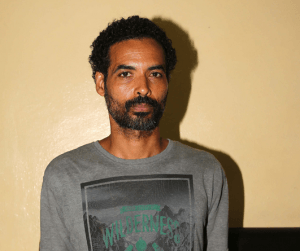Suspect Arthur Sampson-Kent to stand trial in UK on triple murder charges

Arthur Sampson-Kent, a British national accused of killing his girlfriend and two children, is to be extradited to the United Kingdom to stand trial for murder.
A High Court in Accra which gave the green light on Tuesday ordered the Attorney General to compile the relevant documents to facilitate his extradition.
The Court presided over by Mrs Merley Wood further ordered the Bureau of National Investigation to grant Sampson-Kent access to his counsel while in custody.
It, therefore, remanded Sampson Kent, the fugitive into lawful custody.
Sampson-Kent who was put before the High Court instead of the Kaneshie District Court opted to submit himself to the authorities of UK.
Sampson-Kent is being held for three counts of provisional charges of murder, has his plea reserved.
He is alleged to have fled to Ghana after murdering his girlfriend, Sian Blake, 43, and his two children, Zachary, eight, and Amon, four and buried them behind their apartment in Erith in the UK.
The fugitive who spoke through his lawyer, Mr Justice Srem-Sai in court today, said his client side of the story was contrary to what prosecution had read in Court.
Defence Attorney said Sampson-Kent was not running away from justice either here or in the United Kingdom.
“He is not in Ghana to avoid proceedings in the UK. Based on that he does not think that this extradition would be necessary for him.
In fact but for the fact that he has been detained in Ghana, he would have been in the UK by now. He is submitting himself voluntarily to be taken to the UK so that a closure would be put to the story,” Mr Srem-Sai told the Court.
Defence Attorney said “as officers of the court we think it was not necessary any committal proceeding be done. Accused is in the hands of the British Authority”.
Court: Are you sure about what the court has been informed? Your lawyer said you have submitted yourself to the UK authorities without the extradition process?
Sampson-Kent: Yes my Lord.
Court: You were not coerced into coming to this position?
Sampson-Kent: Yes my Lord
Court: So I take it that it was a voluntary decision?
Sampson-Kent: Yes My Lord.
The Court however quizzed Defence Counsel over the fact that he (Counsel) had complained that he did not have access to the facts and charge sheet and wondered how he arrived at that decision.
Mr Srem-Sai said the decision made was not his, adding that the accused person was a citizen of Ghana and as a matter of fact, the Court had power to try his client under the Court’s Act.
Earlier on, Mr Srem-Sai pleaded with the Court to stand the case down so he could confer with client because security agencies and the AG had kept them “in the dark”.
According to Counsel, the AG had flouted the order of the Magistrate’s Court which had directed that Sampson-Kent should have access to his lawyers.
Counsel contended that the lower court also ordered that they should be furnished with relevant documents to facilitate their defence.
“As at now we are yet to receive shred of documents from the AG and we have not received any letter in response to ours, forwarded to prosecution,’’ Mr Srem-Sai said.
According to Counsel if they were given the chance, after offering their client advice, they might oppose to the extradition and prayed the Court to discharge him.
Mrs Rebecca Adjalo, Principal State Attorney, recounted how the Chief Justice had written to them indicating the transfer of the matter from the District Court to the High Court.
Mrs Adjalo told the Court that prosecution had received an INTERPOL Red Alert and based on that the fugitive was rounded up.
The Principal State Attorney announced that they had also received authenticated depositions from the UK and that had given out chronology of the murder carried out by the accused person.
The depositions made up of 100 to 200 pages outlined how the fugitive, after a CCTV footage carried out the act.
The footage highlights how Sampson-Kent left his family home, withdrew money from the bank, and boarded a coach to Glasgow. From Glasgow he boarded a flight to Amsterdam and from Amsterdam to Ghana.
Mrs Adjalo said the British High Commission, Ministry of Foreign Affairs and Attorney General through diplomatic tied received the document and same was forwarded to the Ministry of Interior which is required by law to order the arrest of the fugitive for committal proceedings.
“It was as a result of this that accused was arrested and put before court for him to be remanded in lawful custody at the BNI,” Mrs Adjalo said.
According to her the AG had not flouted any law.
However on receiving that decision taken by accused person, Mrs Adjalo said they had been taken aback.
According to her the law however allowed voluntary extradition.
The Court after listening to the defence and prosecution stood the case down for 30 minutes.
When the Court resumed sitting Mrs Adjalo led the case investigator Detective Corporal Alhaji Ali Ganani, to tender the case brief document requesting the extradition of the fugitive and the arrest warrant.
This was to ensure that the Court had processes on the fugitive recorded.
Detective Corporal Ganani narrated how accused was arrested in Ghana.
The case of the State was that on January 7, the Police received a request from the National Crime Agency through International Police Organization and the British High Commission to assist in the arrest of the accused person who had fled the UK.
Following the request, Mrs Adjalo said a team of detectives was dispatched to hunt for Sampson–Kent in the Western Region.
She said Police Intelligence led to the arrest of Sampson-Kent at Butre, near Busua.
Source: GNA
